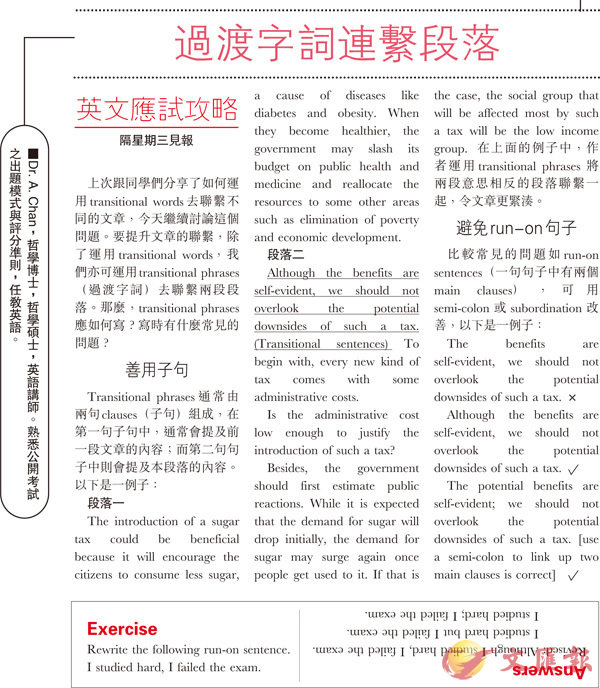
上次跟同學們分享了如何運用transitional words去聯繫不同的文章,今天繼續討論這個問題。要提升文章的聯繫,除了運用transitional words,我們亦可運用transitional phrases(過渡字詞)去聯繫兩段段落。那麼,transitional phrases應如何寫?寫時有什麼常見的問題?
善用子句
Transitional phrases通常由兩句clauses(子句)組成,在第一句子句中,通常會提及前一段文章的內容;而第二句句子中則會提及本段落的內容。以下是一例子:
段落一
The introduction of a sugar tax could be beneficial because it will encourage the citizens to consume less sugar, a cause of diseases like diabetes and obesity. When they become healthier, the government may slash its budget on public health and medicine and reallocate the resources to some other areas such as elimination of poverty and economic development.
段落二
Although the benefits are self-evident, we should not overlook the potential downsides of such a tax. (Transitional sentences) To begin with, every new kind of tax comes with some administrative costs.
Is the administrative cost low enough to justify the introduction of such a tax?
Besides, the government should first estimate public reactions. While it is expected that the demand for sugar will drop initially, the demand for sugar may surge again once people get used to it. If that is the case, the social group that will be affected most by such a tax will be the low income group. 在上面的例子中,作者運用transitional phrases 將兩段意思相反的段落聯繫一起,令文章更緊湊。
避免run-on句子
比較常見的問題如run-on sentences(一句句子中有兩個main clauses),可用semi-colon或subordination改善,以下是一例子:
The benefits are self-evident, we should not overlook the potential downsides of such a tax. ×
Although the benefits are self-evident, we should not overlook the potential downsides of such a tax.
The potential benefits are self-evident; we should not overlook the potential downsides of such a tax. [use a semi-colon to link up two main clauses is correct]
■Dr. A. Chan,哲學博士,哲學碩士,英語講師。熟悉公開考試之出題模式與評分準則,任教英語。
Exercise
Rewrite the following run-on sentence.
I studied hard, I failed the exam.
Answers
Revised: Although I studied hard, I failed the exam.
I studied hard but I failed the exam.
I studied hard; I failed the exam.
隔星期三見報

